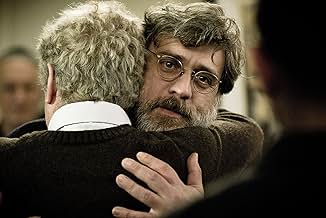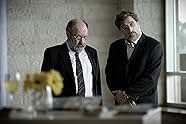Ajouter une intrigue dans votre langueEliezer and Uriel Shkolnik are father and son as well as rival professors in Talmudic Studies. When both men learn that Eliezer will be lauded for his work, their complicated relationship re... Tout lireEliezer and Uriel Shkolnik are father and son as well as rival professors in Talmudic Studies. When both men learn that Eliezer will be lauded for his work, their complicated relationship reaches a new peak.Eliezer and Uriel Shkolnik are father and son as well as rival professors in Talmudic Studies. When both men learn that Eliezer will be lauded for his work, their complicated relationship reaches a new peak.
- Nommé pour 1 Oscar
- 14 victoires et 9 nominations au total
- Eliezer Shkolnik
- (as Shlomo Bar Aba)
- Yehudit Shkolnik
- (as Alisa Rosen)
- Dikla Shkolnik
- (as Alma Zak)
- Committee Member
- (as Shmulik Shilo)
- Committee Member
- (as Albert Illouz)
- TV Host
- (as Jacky Levy)
Avis à la une
It's simply an enjoyable and light little movie, that doesn't ever get too heavy handed, even though it could had easily gone that way. And I thank the movie for that but at the same time it's also giving too little in return.
The movie is taking a more comedy approach to its buildup but with as a problem that there isn't really any true comedy in this movie. It sort of reminded me of a Wes Anderson movie. They are supposed to be comical movies, without anything comical ever happening in it really. It's just not my favorite style of film-making but I know I'm probably a minority on this, so to most people, this won't be a complaint at all.
It's a movie with a good enough story, that ensures that the movie keeps going at all time. It's definitely not a boring movie to watch, despite of a slower type of approach at times.
I wasn't the biggest fan of its visual and technical approach though. I don't know, I guess I have just seen a bit too many movies like this already, so I'm sort of starting to get fed up with these type of movies looking all the same with its camera-handling and editing, that all should remind you of a more indie type of movie. I really did wish that this movie would bad done some more new and interesting stuff at times. That way I would had, no doubt, got more into the movie and would had found it more interesting and pleasant to watch all. It now instead is not a movie that I can wholeheartedly or enthusiastically recommend to you, since it just isn't ever doing anything special, with its story, characters or visuals.
Certainly not bad and still quite good for what it is but it's still a movie you could so easily do without.
7/10
http://bobafett1138.blogspot.com/
The premise is fairly straightforward. A father and son are both philogy professors at the Hebrew University of Jerusalem. Eliezer Shkolnik is an old school researcher who believes findings are only valid if research is conducted in the proper scientific method, while his son, Uriel, follows the more modern philosophy. Eliezer loathes the popularity and acceptance of the current methods, and is so stubborn he even refuses to cancel one of his classes even though only one student is signed.
Having background on research methods or philology is not necessary however, when it comes to following along the movie. Shlomo Bar'aba and Lior Ashkenazi, as Eliezer and Uriel respectively, both make sure to humanize their characters and portray their conflicting ideals by showcasing conflicting personalities as wells.
The plot gets really interesting when Eliezer finds out he has been voted the winner of the Israel Prize, forcing him to rethink how he feels his colleagues, and the field in general. However, Uriel soon gets a phone call that will shake things up even more.
Unfortunately, Footnote does not deliver a satisfying conclusion, at least not a memorable one. The tension is slowly built up really well as the film cuts deeper into the plot, yet when the time comes for a huge clash, the film ends up kinds of just floating around not knowing the right time to fade out. However, the meat of the film is too good to be ignored, as both Bar'aba and Ashkenazi deliver performances you won't soon forget.
The film centers on Eliezer Shkolnik (Schlomo Bar Aba), an aging Talmudic scholar and philologist, who has become a bitter and aggrieved man after having been passed over for the prestigious Israel Prize for twenty years. Eliezer arrogantly denounces the selection committee for the Prize as people who have forgotten the meaning of true scholarship. He has spent his career researching corrupted Jewish texts that deviate from the original Talmud, but whose only recognition has been a citation in a footnote.
Ill at ease in the hallowed walls of academia and in relationships in general, Eliezer sleeps in his office and only ventures out to go to the library. He continues to schedule classes even though as little as one or two people enroll. His relationship with his wife Yehudit (Alisa Rosen) appears strained and distant and, when he is at home, he blocks out the world by putting on gigantic yellow earphones. His behavior is contrasted with that of his more sociable and outgoing son, the bearded Uriel (Lior Ashkenazi) who is also a Talmudic scholar but one whose work is more attuned to popular tastes. His father, unfortunately, is generally disdainful, calling him a "folklorist" and a scholar subservient to the prevailing academic status quo.
The film opens with Eliezer sitting in an auditorium with a dour and rigid look on his face as Uriel is being inducted into a scholarly academy, an honor which the father has never received. Despite the downbeat beginning, the first part of the film is fairly lighthearted with Cedar entertaining us with inter-titles describing the background of the characters and Amelie-like cutesy cinematic tricks bouncily scored by Amit Poznansky. Halfway through, however, the film takes a more dramatic turn when Eliezer learns that he has finally won the Israel Prize after waiting for twenty years, an event that threatens the resentment he clings to so obsessively.
Unfortunately, a ridiculous faux-pas by the Nominating Committee only serves to place more obstacles in the father-son relationship. It is, unfortunately, not an easily correctable mistake but a true ethical dilemma and one that precipitates a confrontation between Uriel and the academic committee in a tiny room, an absurd scenario that would be funny if it did not have so many potential disastrous ramifications. The brunt of Uriel's attack is directed towards Yehuda Grossman (Michah Lewesohn), a scholar who has either rejected or ignored his father's work and whose publication of his own Talmudic discovery undermined all the meticulous research Eliezer had been doing for years. In the film's most dramatic sequence, the confrontation escalates into highly articulated personal attacks, ultimatums, and even a bit of physical violence.
While Uriel is defending his father at the committee meeting, Eliezer is doing the opposite, criticizing his son during an interview, lumping him in with those whose Talmudic studies he considers to be shallow and superficial. Needless to say, this even further exacerbates their troubled relationship. Footnote is an engaging film marked by exceptional performances by Lewesohn, Ashkenazi, and Bar Aba and you can enjoy it whether or not you care very much whether or not the current version of the Talmud correctly reflects the original ancient texts. The depiction of Eliezer, however, is one-dimensional and the father's incessant self-righteousness turns the film into a sour and mostly unpleasant affair. In addition to its depressing tone, numerous plot points are introduced and then dropped without further comment.
Eliezer is seen talking to another woman, a sequence that leads to a bedroom discussion of the event between Uriel and his wife Dikla (Alma Zack), but soon morphs into an argument, its purpose obscure. Also in another thread that goes nowhere except to add to the general unpleasantness, Uriel's son Josh (Daniel Markovich) goes on a hiking trip and comes home having to confront his father's anger at his ostensible lack of ambition or goals. Although the film's loose ends are particularly annoying, we are caught up in its very compelling scenario. Cedar knows how to build up the tension and we eagerly await some sort of resolution but, as is the trend of late, the director feels that his film is more valuable as a gigantic set-up than as a satisfying resolution and the result is a film that leaves us thinking that the projectionist inadvertently cut out the best part of the movie.
Le saviez-vous
- AnecdotesJoseph Cedar is the son of the Israel Prize recipient, Haim Cedar.
- GaffesAt around 38:00, when Uriel enters the room that the committee is meeting in for the first time, he can open and close the door easily. But when he returns with a chair a few seconds later, suddenly there's not enough space to close it, despite his chair not being in the way.
- Citations
Uriel Shkolnik: [to a student] I will tell you something that my father told me once: Your work has many things correct and many things innovative. Unfortunately, the innovative things are not correct and the correct things are not innovative.
- Crédits fousThe credits for the major cast and crew members all have the initial letters of their names in bold, echoing the plot device that causes the confusion between the father and son.
- ConnexionsFeatured in At the Movies: Cannes Film Festival 2011 (2011)
Meilleurs choix
- How long is Footnote?Alimenté par Alexa
Détails
- Date de sortie
- Pays d’origine
- Site officiel
- Langue
- Aussi connu sous le nom de
- Down the Hill
- Lieux de tournage
- Sociétés de production
- Voir plus de crédits d'entreprise sur IMDbPro
Box-office
- Montant brut aux États-Unis et au Canada
- 2 007 758 $US
- Week-end de sortie aux États-Unis et au Canada
- 47 528 $US
- 11 mars 2012
- Montant brut mondial
- 2 451 259 $US
- Durée
- 1h 47min(107 min)
- Couleur
- Mixage
- Rapport de forme
- 2.35 : 1




































